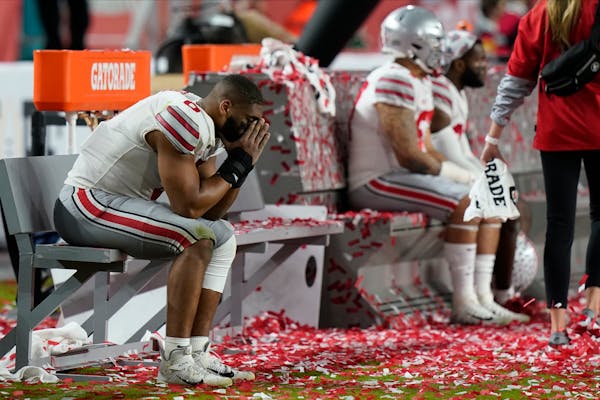 See
more of the story
See
more of the story
College football crowned a new national champion Monday night, and thus the strangest and most tenuous season on record ended in a familiar place. With Alabama holding the trophy.
The Crimson Tide scored with remarkable ease to rout Ohio State 52-24 in a predictably one-sided game that was basically over at halftime.
College football has a problem. A freshness problem. A problem that exists because the system that decides a champion has created a monotonous spin cycle.
I love college football more than any other sport, and I worry about it becoming less appealing in the eyes of the general public because the College Football Playoff has morphed into Groundhog's Day.
Since its inception, the playoff has become an exclusive club of a few blue blood programs that maximize the sport's absence of parity.
The CFP is in its seventh year, which equates to 28 bids. Only 11 teams have participated so far. Alabama, Clemson, Ohio State and Oklahoma alone have accounted for 20 of the 28 spots.
No school outside of the Power Five or Notre Dame has scaled the wall. Cincinnati went 9-0 with a top-10 defense this season and was treated like an outsider by the selection committee.
The Pac-12 has not appeared in the CFP since 2016 and has fallen off the radar to such a degree that the conference almost feels like an afterthought within the power structure.
This can't be good for the overall interest in the sport.
Don't blame teams who keep getting selected. Tweak the system.
As much as I resisted this idea before, the CFP needs to expand to eight teams as quickly as possible. I would even welcome a 16-team field at some point. Eight is a logical next step.
The model that I support features an eight-team field with automatic bids to Power Five champions, an automatic bid to the highest-rated Group of Five team and two at-large bids.
Realistically, a 16-team playoff is a long way down the road (and might even be a pipe dream), but imagine the interest, excitement — and financial windfall in TV revenue — that a bracket of that scope would produce.
ESPN's contract for the CFP runs another five seasons, so it's unclear how soon change could happen. But do stakeholders in those deliberations honestly believe that the sport's best interest is tied to five more years of Alabama-Clemson rematches and only a small fraction of schools having true access to the playoff?
Open it up. Give more teams a shot. Move closer to a real playoff.
"It's time," said Craig Thompson, Mountain West commissioner and University of Minnesota graduate. "I think it's somewhere in the two-to-five-years time frame. It might not have to go through the end of the contract."
Thompson said he believes there is an appetite for playoff expansion among his fellow conference commissioners. Thompson's primary objective is to maintain college football's popularity post-pandemic.
"There were a couple of very special undefeated teams this year in Cincinnati and Coastal Carolina," Thompson said. "That wouldn't have brought the industry to a screeching halt if they were to play [in the playoffs]. They were good teams, entertaining teams, teams where people go, 'I've never seen them before. I'm going to tune in.' "
Expanding the playoffs by four teams won't devalue the regular season or strip it of drama, which has long been my concern. Saturdays in the fall would remain a thrill ride.
One knock on expansion is the likelihood of more blowouts. Guess what? The semifinals with only four teams regularly produce lopsided scores too. At least fans in more areas of the country will have more incentive to emotionally invest, knowing their team has a chance at something above a bowl game.
The king-of-the-hill nature of college football is a product of recruiting vs. drafting talent. The worst professional teams get first dibs on picking the best players. In college football, the best teams typically sign the best recruiting classes. So that cycle is hard to break. The result is a playoff that features the same few teams every year.
Alabama, Ohio State and Clemson still will be safe bets to win the trophy in a larger playoff. Inviting more teams to the party would create more interest and fun, and there's nothing wrong with that.



